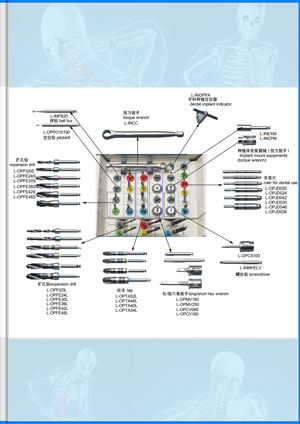The development of implant denture is the product of the continuous innovation and progress of implant materials. The key to the innovation is the development of artificial root materials. In recent years, the most widely used materials are mainly the following categories.
1. Metal and Alloy Material Dental Implant Material
It includes gold, 316L stainless steel (iron-chromium-nickel alloy), cast cobalt-chromium alloy, titanium and alloy, etc. Its advantages are high strength and good rigidity, but its biomechanical adaptability and tissue and bone adaptability are poor.
2. Ceramic dental implants
It includes bio-inert ceramics, bio-active ceramics, biodegradable ceramics and so on. It has the characteristics of high mechanical strength, corrosion resistance, no irritation and toxicity, and tissue compatibility. At present, it is also used clinically.
3. Carbon-based dental implants
It includes glass carbon and isotropic carbon at low temperature. The advantage is that the organism has high stability and no biodegradation. The disadvantages are it is brittleness, black and of limited use.
4. Polymer dental implants
It includes acrylates, polytetrafluoroethylene and so on. Some macromolecule materials have similar chemical structure with natural macromolecule in human structure, but they are easily degraded and stimulated by organisms.
5. Composite
dental implant materials
Composite of two or more materials, such as spraying ceramics on metal surface. Human teeth are often composed of complex organic and inorganic components. Due to the limitation of single structure, the single material mentioned above can not meet the requirements of organisms. Therefore, the application of composite materials has become increasingly widespread. For example, carbon-coated metal composites, porous coated alumina materials and so on, complement each other's strengths and weaknesses, making the performance more perfect.
At present, the main materials used in dental implants are pure titanium and titanium alloy. Titanium metal has light specific gravity, high strength, no magnetism, small shrinkage, stable chemical properties, excellent corrosion resistance and tissue compatibility. Other ceramics have bioactive ceramics and some composite materials.

 +86-021-50327060
+86-021-50327060
 zq@lzqtech.com
zq@lzqtech.com
 Medical Instrument
We can achieve perfect edge quality and dimensional tolerance up to±0.0005mm (±0.5μm) in the process of micro, ultra-long, ultra-thin, super-abrasive, impact-resistant, high-precision and combined ... VIEW MORE
Medical Instrument
We can achieve perfect edge quality and dimensional tolerance up to±0.0005mm (±0.5μm) in the process of micro, ultra-long, ultra-thin, super-abrasive, impact-resistant, high-precision and combined ... VIEW MORE Implant
Corresponding and matching drills and tools of different types, forms, shapes, structures can be high precisely ground to mold according to different brands and different types of implants forms, shap... VIEW MORE
Implant
Corresponding and matching drills and tools of different types, forms, shapes, structures can be high precisely ground to mold according to different brands and different types of implants forms, shap... VIEW MORE Cutting Tools
Super-hardness machining for special, non-standard new ite ms with different size and tolerance. VIEW MORE
Cutting Tools
Super-hardness machining for special, non-standard new ite ms with different size and tolerance. VIEW MORE Accessory Parts
we can customize for you according to your samples or drawings for any manufacturing of ceramic,carbide,stainless high-speed steel, stainless steel, titanium alloy, titanium diamond, etc series, hig... VIEW MORE
Accessory Parts
we can customize for you according to your samples or drawings for any manufacturing of ceramic,carbide,stainless high-speed steel, stainless steel, titanium alloy, titanium diamond, etc series, hig... VIEW MORE


 +86-021-50327060
+86-021-50327060 
 NO.1269 Plant, Jinhu Road, Jinqiao Export Processing Zone, Pudong New District, Shanghai, China.
NO.1269 Plant, Jinhu Road, Jinqiao Export Processing Zone, Pudong New District, Shanghai, China. 
